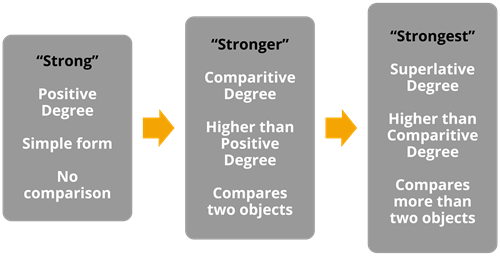
PUMPA - SMART LEARNING
எங்கள் ஆசிரியர்களுடன் 1-ஆன்-1 ஆலோசனை நேரத்தைப் பெறுங்கள். டாப்பர் ஆவதற்கு நாங்கள் பயிற்சி அளிப்போம்
Book Free DemoAdjectives are words that are used to describe the noun. Now, let's take a look at comparison adjectives. Adjectives change in "form" show comparison.
Positive adjectives are adjectives in a simple form, and they do not express any comparison.
Comparative adjectives are used to compare two objects/persons.
Superlative adjectives are used to compare more than two objects/persons.
Consider the following:
- John is a strong man.
- David is stronger than John.
- Martin is the strongest of all the three men.
Statement 1 shows that John is strong - this is called Positive degree
Statement 2 brings in a comparison standard to show David is stronger - this is called Comparative degree
Statement 3 brings about a comparison to say that Martin is the strongest - this is called Superlative degree

Important!
The superlative degree can also be used when there is no comparison. For example, I'm the most fortunate person today! It simply means the quality of a high degree.
Formation of Comparative and Superlative from positive adjectives by following simple rules:
Condition | Positive adjective | Comparative | Superlative |
| Adjective | Add 'er' | Add 'est' | |
Sweet | Sweeter | Sweetest | |
Strong | Stronger | Strongest | |
Adjectives ending in 'e' | Add 'r' | Add 'est' | |
Noble | Nobler | Noblest | |
Brave | Braver | Bravest | |
Adjectives ending in 'y' | Remove 'y' add 'ier' | Remove 'y' add 'iest' | |
Wealthy | Wealthier | Wealthiest | |
Happy | Happier | Happiest | |
Adjective in one syllable | Double the last consonant and add 'er' | Double the last consonant and add 'est' | |
Hot | Hotter | Hottest | |
Fat | Fatter | Fattest | |
Adjective with more than two syllable | Prefix 'more' | prefix 'most' | |
Useful | More useful | Most useful | |
| Difficult | More difficult | Most difficult | |
Courageous | More courageous | Most courageous |
Important!
It has to be noted that, to compare two qualities in the same object/person, 'er' cannot be used in the comparative. For example, These mangoes are more sour than sweet. Here two qualities of the same mango are discussed. Therefore 'er' is avoided and 'more' is used. In general comparison, it would have been "These mangoes are sweeter than apples".
Next, let's take a look at Irregular comparison. These adjectives do not fall in any of the above rules and are not formed from the positive adjective.
| Good | Better | the best |
| Bad | Worse | the worst |
| Far | Farther | the farthest |
| Little | Less | the least |
| Late | Later, Latter | the latest |
| Old | Older, elder | the oldest, the eldest |
| Far | Further | the farthest |
For a better understanding, examine the following with examples:
I. Good-better-best:
Example:
1. Ram is good in studies.
2. Rahim is better than Jack in studies.
3. Rosy is the best of all the students in the class.
II. Late-later-latest: Later and latest refer to time, latter and last refer to position.
Example:
1. John is late for school.
2. Mary is later than I expected.
3. You should be updated with the latest news.
4. The latter pages of the book were torn.
5. My school building is the last one on this street.
III. Old-Older/Elder-Oldest/Eldest: Elder/eldest is used for persons only and not for objects. Elder is used with "to" and not with "than". Older/oldest can be used for both objects and persons.
Example:
1. My brother is five years old.
2. My brother is five years older than me/ My brother is five years elder to me.
3. My brother is the eldest of the three / My brother is the oldest of the three.
4. We visited the oldest buildings to see the architecture.
IV. Far-further-farthest: Used to describe distances.
Example:
1. He lives far from the city.
2. Jack lives further down the city.
3. We had chosen the farthest point to finish our race.